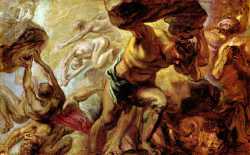Greek mythology

The body of traditional tales concerning the gods, heroes, and rituals of the ancient Greeks. Critical Greeks, such as Plato in the 5th-4th century, recognized the considerable element of fiction in the myths, although in general the Greeks viewed them as true accounts.
The major deities in Greek or Hellenic mythology are the twelve Olympians. They are: Zeus, the chief god; Poseidon, the god of the sea; Hades, the god of the underworld; Hestia, the goddess of the hearth; Hera, Zeus' wife and protector of (married) women; Ares, the god of war; Athena, the goddess of battle and wisdom; Apollo, the sun-god and patron of music and poetry; Aphrodite, the goddess of beauty and love; Hermes, the messenger of the gods; Artemis, the goddess of the hunt; and Hephaestus, the lame god of fire and crafts.
For Greek personages and events, see the Greek people section.
Browse
Recommended reading
- Bulfinch, Thomas. (2000). Bulfinch's Greek and Roman Mythology: The Age of Fable.
- Smith, William. (1870). Dictionary of Greek and Roman Biography and Mythology.
- Graves, Robert. (1965). Greek Gods and Heroes.
- Ovid (ed. A. D. Melville). (2009). Metamorphoses.
- Hamilton, Edith. (1999). Mythology: Timeless Tales of Gods and Heroes.
- Buxton, Richard. (2004). The Complete World of Greek Mythology.
- Graves, Robert. (1999). The White Goddess.